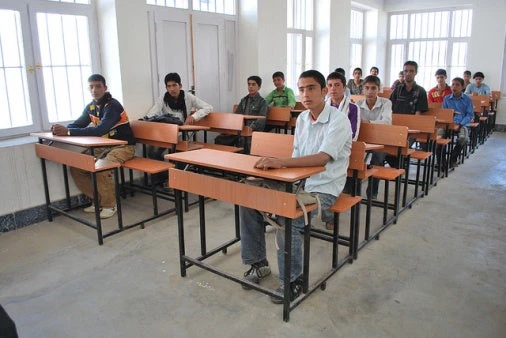 In Tunis this month, the Arab Regional Agenda for Improving Education Quality (ARAIEQ) held its second annual meetings of representatives from institutions from across the region. The idea for this network is simple enough: Arab countries face a now well-recognized challenge—the need to improve the quality and relevance of their education systems. It therefore stands to reason that they should share solutions. They met to review the progress made in the past year and discuss how to work more closely together in the future. What have they accomplished?
In Tunis this month, the Arab Regional Agenda for Improving Education Quality (ARAIEQ) held its second annual meetings of representatives from institutions from across the region. The idea for this network is simple enough: Arab countries face a now well-recognized challenge—the need to improve the quality and relevance of their education systems. It therefore stands to reason that they should share solutions. They met to review the progress made in the past year and discuss how to work more closely together in the future. What have they accomplished?
Assessment: Creating measurably better systems
Often, stakeholders—families, educators, firms, and governments—are surprisingly unaware of the state their schools are in: they are “in the dark”, as it were. By promoting open evaluation where data on the quality of education systems, schools, and student learning, is made public, they can effectively “turn on the lights”. This is the objective of ARAIEQ’s evaluation program, hosted by UNESCO-Beirut, and managed out of Sudan for the moment. Using a Systems Approach with Better Education Results created by the World Bank, a report is being finalized on the state of educational assessment in the region.
ICT: It’s not about the device
Research shows that what works best to improve learning in developing countries includes ICT and teacher training, which is why ARAIEQ has programs devoted to them. Despite the rush to put technology to use in education, it is becoming clear that the device is not the solution in itself. As another World Bank blog shows, quite convincingly, computer interventions “haven’t worked when given to students and parents without any training”. Nor did they work when a tutoring plan for using them was ignored, or when they replaced time that would have otherwise been used for teaching.
Computer-assisted learning was found to be highly effective, though, with tutoring software, the curriculum, and a plan for using it. ARAIEQ’s ICT program has studied these, as well as regional-specific questions, such promoting the growth of Arabic-language educational content on the Internet. It has also launched the first Arabic-language MOOC (Massive Open Online Course).
Invest in teachers!
That teachers have the greatest impact on learning should come as no surprise: countries with high learning outcomes clearly show this. Public investment in teachers, and their professional development, is critical to any reform aimed at improving education; they should represent the most significant investment in the public sector budget. The ARAIEQ program for teachers—hosted by the Queen Rania Teachers Academy in Amman, Jordan—has developed a draft framework of teachers’ standards for the Arab region and held a capacity-building workshop about school leadership.
Early Childhood Development: Also a critical investment
There is massive, unequivocal evidence that Early Childhood Care and Education is the best investment any country can make because it builds the foundation for readiness for schooling, multiplying the chance of a better outcome for students, dramatically reducing failure rates and the risk of repeating academic years or dropping-out. ARAIEQ’s program works on all aspects of this: In 2013, the program compiled an annotated bibliography of existing regional Early Childhood Development (ECD) research and resource persons, and presented a first draft of materials and tools to help train kindergarten teachers.
Entrepreneurship: Helping students help themselves
At the other end of the schooling spectrum is one of the Arab world’s most pressing problems—finding ways to absorb the 80 million young people who will be leaving school over the next ten years to desperate search for jobs. Arab decision makers don't have to look far to find an effective model. From Casablanca to Ramallah to Jeddah, 100,000 students in eleven Arab countries are learning from professionals in their communities, gaining skills they need to become employees of choice in the private sector, or learning how to start their own businesses through INJAZ-Al Arab, the host institution for the ARAIEQ program on entrepreneurship. Last year, it finalized a report “Preparing Arab Youth for the World of Work” and organized the Second Arab Educators’ Meeting in Amman, Jordan, in March 2014.Working together
The Arab League’s Educational, Cultural, and Scientific Organization (ALECSO), where ARAIEQ’s program office is located, hosted these meetings, welcoming directors from the five ARAIEQ programs in assessment, ICT, teacher policies, ECD, and entrepreneurship—all recognized as contributing to improving the quality of education.
Each ARAIEQ program works on three sets of tasks to generate knowledge, establish policies, and promote good practice, creating networks of specialists in its field. Each program seeks to act horizontally and vertically: horizontally by bringing together stakeholders at a similar level, such as policy makers from different countries; and vertically with stakeholders from different disciplines, such as practitioners and researchers.
Their programs look for synergies, simply because issues in education are never isolated. So, for example, ARAIEQ’s programs on Teacher Policies and Early Childhood Development joined forces last year to host a workshop on ECD teaching. In this way, a truly pan-Arab network is developing dedicated to improving issues in education common to the region. For more information, please visit ARAIEQ’s new website: http://araieq.alecso.org/


Join the Conversation